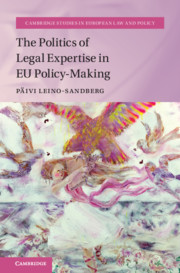10 results
THE ORGANIZATION OF EVIDENCE IN ATHENIAN COURTS: CONTAINERS, SEALS AND THE MANAGEMENT OF DOCUMENTS
-
- Journal:
- The Classical Quarterly , First View
- Published online by Cambridge University Press:
- 14 February 2025, pp. 1-12
-
- Article
-
- You have access
- Open access
- HTML
- Export citation
12 - Legal Expertise, Environmental Groups and Brexit: Beyond the Limits
- from Part III - External Legal Expertise
-
-
- Book:
- Law, Legal Expertise and EU Policy-Making
- Published online:
- 13 October 2022
- Print publication:
- 20 October 2022, pp 246-268
-
- Chapter
- Export citation
7 - The Politics of Legal Expertise at Westminster in Times of Crisis
- from Part II - In-House Legal Expertise
-
-
- Book:
- Law, Legal Expertise and EU Policy-Making
- Published online:
- 13 October 2022
- Print publication:
- 20 October 2022, pp 124-146
-
- Chapter
- Export citation
4 - Lawyers, Revolving Doors and the Public-Private Foundations of the French Regulatory State
- from Part I - Theorising Legal Expertise
-
-
- Book:
- Law, Legal Expertise and EU Policy-Making
- Published online:
- 13 October 2022
- Print publication:
- 20 October 2022, pp 55-71
-
- Chapter
- Export citation
11 - Rock ’n’ Roll Stars or Guitar Technicians? Legal Advisors As Legal Experts in NGO Lobbying
- from Part III - External Legal Expertise
-
-
- Book:
- Law, Legal Expertise and EU Policy-Making
- Published online:
- 13 October 2022
- Print publication:
- 20 October 2022, pp 218-245
-
- Chapter
- Export citation

The Politics of Legal Expertise in EU Policy-Making
-
- Published online:
- 16 September 2021
- Print publication:
- 23 September 2021
Legal Lobbying: The Evolving (But Hidden) Role of Lawyers and Law Firms in the EU Public Affairs Market
-
- Journal:
- German Law Journal / Volume 22 / Issue 1 / January 2021
- Published online by Cambridge University Press:
- 27 January 2021, pp. 65-84
-
- Article
-
- You have access
- Open access
- HTML
- Export citation
4 - Honor of the Imperial Officials
-
- Book:
- Honor and Shame in Early China
- Published online:
- 13 November 2020
- Print publication:
- 10 December 2020, pp 124-156
-
- Chapter
- Export citation
Losing the local? Public participation and legal expertise in planning law
-
- Journal:
- Legal Studies / Volume 40 / Issue 2 / June 2020
- Published online by Cambridge University Press:
- 20 January 2020, pp. 269-285
- Print publication:
- June 2020
-
- Article
- Export citation
Technological Agency in the Co-Constitution of Legal Expertise and the US Drone Program
-
- Journal:
- Leiden Journal of International Law / Volume 26 / Issue 4 / December 2013
- Published online by Cambridge University Press:
- 08 November 2013, pp. 811-831
-
- Article
- Export citation


